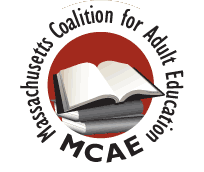MCAE PUBLICATIONS
Briefing Paper: Managed Enrollment: An Opportunity to Reinvigorate the Adult Basic Education Experience
By Alisa Povenmire, August 2006
Curriculum: Your Government, Your Taxes, Your Choices
Developed for MCAE by Diana Satin and Nancy Sheridan
Standards for Quality Working Conditions in ABE/ESOL Programs
Developed by the joint MCAE/MATSOL Working Conditions Committee, updated January 2007 by the MCAE Working Committee
White Paper: The Importance of the Adult Basic Education System to Workforce Development
By the MCAE Public Policy Committee, December 2006
GENERAL PUBLICATIONS
111th Congress Reauthorization of the Adult Education and Family Literacy Act
The National Coalition for Literacy prepared recommendations for reauthorization of the WIA for the 111th Congress along with a side by side analysis of the Workforce Investment.
2008 GED Testing Program Statistical Report
This annual report provides background on the GED program and demographic and GED tests performance data on adults who passed the GED exam.
A Comparison of WIA Recommendations from The National Commission on Adult Literacy and National Coalition for Literacy
Issued by ProLiteracy at the request of Congress April 2009, written in 2008.
A Little Too Much from the Heart? Working Conditions and ABE
A reflection by Cathy Coleman in Field Notes, Volume 16, Number 3, page 5.
American Institute for Research Highlights from the 2003 Massachusetts State Assessment of Adult Literacy
AIR analysed the 2003 NAAL data and issued the reports, which were released in Spring 2006. Massachusetts was one of six states that obtained detailed information on the prose, document interpretation, and quantitative literacy skills of their populations
An Unstable Ladder: How the Fiscal Crisis is Threatening Education and Work Support Programs for Many Women
This report was released by the Massachusetts Budget and Policy Center in January 2010. One section is devoted to Adult Basic Education.
Evaluating Professional Development Resources Selection and Development Criteria
A publication by AALPD PRO-NET 2000, providing a set of criteria and indicators to (1) help program and professional development staff select and evaluate professional development materials and resources, and (2) help professional developers and researchers prepare and develop quality resources.
GED and Recidivism: 1998 Releases from the Massachusetts Department of Correction
Published in 2007, this report examines how obtaining a GED in prison affects recidivism within the state prison system by examining a population of inmates released in 1998.
How Teachers Change: A Study of Professional Development in Adult Education
NCSALL Reports #25 November 2003
Indirect County and State Estimates of the Percentage of Adults at the Lowest Literacy Level for 1992 and 2003
Statistics based on the 2003 NAAL report.
Laboring to Learn: Women's Literacy and Poverty in the Post-Welfare Era
Former MCAE Board Member Lorna Rivera's groundbreaking study on women's experiences in these mandatory adult education programs and whether the programs reproduce the conditions that forced women to drop out in the first place.
Massachusetts Immigrants by the Numbers: Demographic Characteristics and Economic Footprint
This 2009 report provides a comprehensive picture of immigrants’ characteristics and their contributions as well as challenges to their effective integration into the economic and social life of Massachusetts. It was prepared for the Immigrant Learning Center, Inc. by the Institute for Asian American Studies at UMass-Boston.
Massachusetts Institute for a New Commonwealth
Periodic reports issued by MassINC on such subjects as adult education, the economy, the workforce, immigration and the public schools.
National Assessment of Adult Literacy
The 2003 NAAL - National Assessment of Adult Literacy, conducted by the National Center for Education Statistics (NCES), describes the English literacy of America’s adults 16 years of age and older based on a sample of more than 19,000 adults from across the United States. It is the first such study conducted since 1992.
National Initiatives Relevant to Professional Development in Adult Literacy
Standards for staff development by the National Staff Development Council in 2001.
NCSDAE Analysis of the Adult Education and Economic Growth Act
National Council of State Directors of Adult Basic Education (NCSDAE) analysis of the bill filed by to replace WIA.
Position Paper on Equitable Treatment for Part-time, Adjunct, and Contingent Faculty
Published by TESOL in 2003. Amended in 2006.
Preliminary Survey Results of ESOL Teachers in Adult Basic Education and Literacy Systems
A TESOL-sponsored special project authored by Yilin Sun and Rosie Maum. Published in KYTESOL Newsletter, Volume XXVI, No. 1, Fall 2005.
Proposed Changes to WIA Title I—Workforce Investment Systems
A memorandum drafted by Congressional Research Services on the proposed changes to the Workforce Investment Act contained in the Adult Education and Economic Growth Act of 2009
State Assessment of Adult Literacy for Massachusetts
The most current report by the National Center for Education Statistics, released in 2003, on adult literacy in the Bay State.
Strengthening State Policies to Increase the Education and Skills of Low-Wage Workers
A policy brief of the Working Poor Families Project, authored by Adair Crosley and Brandon Roberts, Spring 2007.
Strengthening State Adult Education Policies for Low-Skilled Workers
A policy brief of the Working Poor Families Project, authored by Amy-Ellen Duke and Evelyn Ganzglass, Summer 2007.
Teacher Quality and Career Pathways
Recommendations by the Association of Adult Literacy Professional Developers (AALPD) for the Reauthorization of the Workforce Investment Act
Teacher Retention in Adult Literacy Programs: Uncharted Territory - or Something We Already Know How to Achieve?
Written by Harriet Vardiman Smith with Dr. Victoria Hoffman and Ken Appelt and published in Literacy Links, Volume 9, No. 4, October 2005.
The Change Agent
The Change Agent is a biannual newspaper for adult educators and learners published by the New England Literacy Resource Center at World Education. Each issue explores a different social justice topic through news articles, opinion pieces, classroom activities and lessons, poems, cartoons, interviews, project descriptions, and printed and web-based resources.

